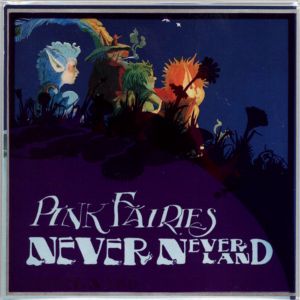
- Format: MP3

The excessive, drug-fueled Pink Fairies grew out of the Deviants, a loose-knit band formed in 1967 by members of the West London hippie commune Ladbroke Grove. Initially dubbed the Social Deviants and consisting primarily of vocalist Mick Farren, guitarist Paul Rudolph, bassist Duncan Sanderson and drummer Russell Hunter, the group also featured satellite members Marc Bolan, Steve Peregrine Took and players from the band Group X, later rechristened Hawkwind. After three noisy, psychedelic albums and a U.S. tour, Farren exited to become a music journalist; the remaining Deviants returned to London, where they recruited vocalist and former Pretty Things drummer Twink (born John Alder), who suggested the name Pink Fairies. Despite gaining a reputation for mythic debauchery, the group remained largely an underground sensation before signing to Polydor and issuing their 1971 debut Never Never Land, a manic, decadent album featuring the live staples "Do It" and "Uncle Harry's Last Freak Out."
Shortly after the record's release Twink departed, and the Pink Fairies continued on as a trio for 1972's What a Bunch of Sweeties; recorded with assistance from the Move's Trevor Burton, the album reached the Top 50 on the U.K. charts, and was the group's most commercially successful effort. Soon, Rudolph exited to become a full-time member of Hawkwind, and was replaced by UFO's Larry Wallis for 1973's hard-rock excursion Kings of Oblivion. Twink rejoined the Pink Fairies' ranks a short time later, but the group nonetheless disbanded before the end of the year.
In 1975, the Kings of Oblivion-era line-up reunited for a one-off London gig; an enthusiastic response led to the official reformation of the nucleus of Rudolph, Sanderson and Hunter, who added former Chilli Willi and the Red Hot Peppers vocalist Martin Stone before again disbanding in 1977. A decade later, the original line-up -- minus Rudolph, but including Wallis -- reunited for the album Kill 'Em and Eat 'Em before calling it quits yet one more time.
NEVER NEVERLAND 1971:
Kicking off the most exhaustive exhumation yet of the Pink Fairies' early-'70s catalog, the remastered Neverneverland readily takes its place among the era's most crucial debuts, a hard-rocking, free-flowing and, above all, anarchic monster that opens with the definitive statement of Yippie intent, "Do It," and doesn't look back. Titled for radical Jerry Rubin's book of the same name, "Do It" remains a manifesto for the revolution that never quite got off the ground, a gutsy affirmation that the Pink Fairies were never to eclipse. Originally released as a January 1971 single, "Do It" also appears among the bonus tracks in its edited (three-minute) 45 rpm format, together with its turbulent B-side, the similarly barnstorming "The Snake." And it must be admitted that anybody entering the realm of the Fairies from those points of view is in for at least a few surprises. While "Say You Love Me" and "Teenage Rebel" certainly adhere to the band's rockiest tendencies, the ballad "Heavenly Man" sounds like nothing so much as that other pink thing, Floyd, circa Obscured By Clouds, while "War Girl" has a distinct American R&B tinge to it. Other moods float in and out of focus before Neverneverland returns to Free Festival Central for the live crowd-pleaser "Uncle Harry's Last Freakout" -- present in both its 11-minute LP form and, among the bonus tracks, the 12-minute instrumental prototype that was one of the band's first studio attempts at the piece. Needless to say, both are as relentless as the title insists -- and as fiery as the Fairies' own reputation demands they should be.